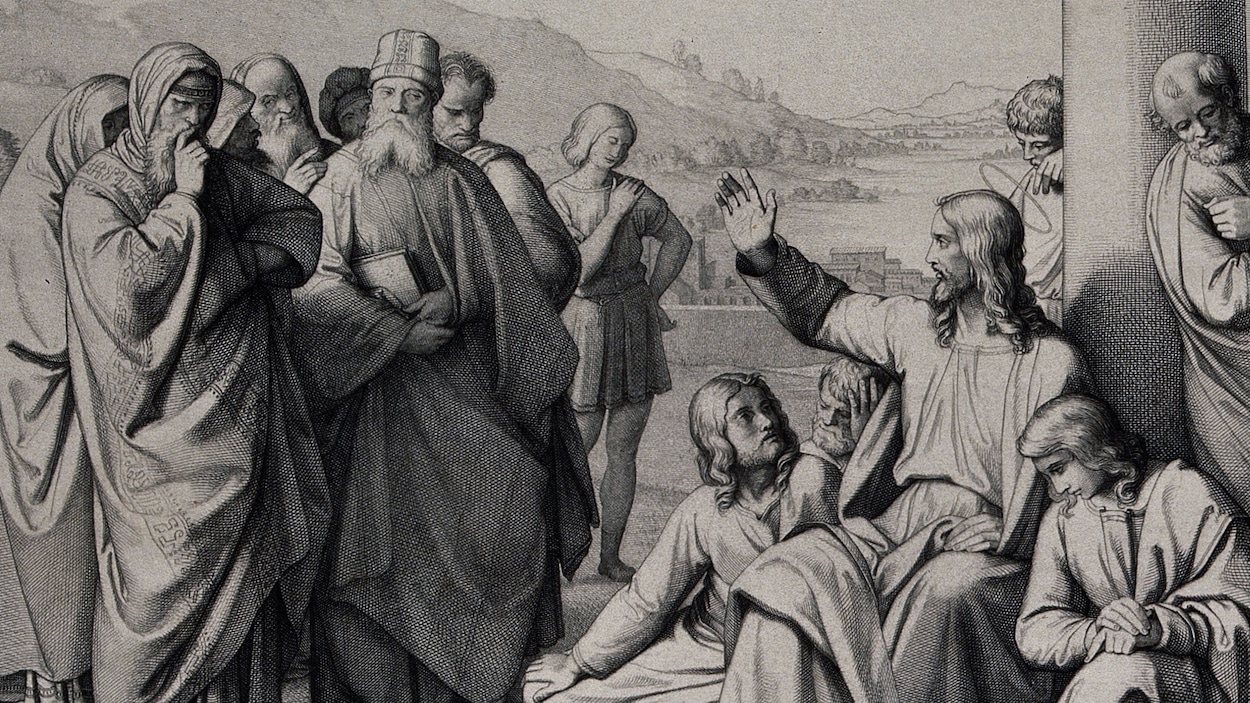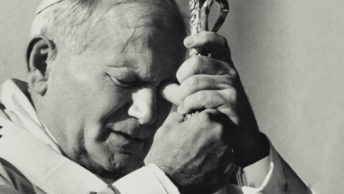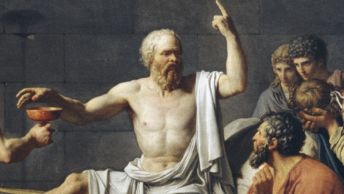This article addresses the most dangerous deception for Catholics, and sadly, it is a deception that is widespread in our parishes, schools, and other Catholic institutions. It is the deception of modern day “Catholic pharisaism,” and its adherents are modern day “Catholic Pharisees.” In short, this deception consists in the living out of the external forms of the Catholic faith, going to Mass, sending your kids to Catholic school, etc., without the desire to have a relationship with Christ, to get to know Him, to become friends of Christ. [1] It is an insidious deception because it masks itself as Catholicism and creates the illusion of real holiness, but in reality, it lacks the most fundamental aspect of authentic Catholicism: a personal relationship with Jesus Christ which has the pursuit of unity with the Sacred Heart of Jesus as its goal. [2]
This deception separates the heart of Catholicism, which is the Lordship of Jesus Christ over every aspect of our lives, [3] from the outward expression of our faith. It is form without substance, akin to the body without the soul, and mistakes pride and exclusiveness for holiness of life. This deception uses the very rituals of the Catholic faith to further the sins of pride and acedia, that is, spiritual apathy. Pride is furthered because those who live this way can honestly believe that they are “good Catholics,” holy people, but in reality, they may have little to no personal relationship with the person of Jesus Christ. They may not even know who Jesus really is. And precisely because there is little to no relationship with Christ, all that matters is fulfilling the requirements by checking off the boxes and being a “good Catholic,” which leads to acedia or spiritual sloth.
But how can anyone be a good Catholic if Christ calls us to love Him with all our heart, mind and soul, [4] and many of these people have no personal relationship with Christ? I have no wish to be harsh, but the truth must be stated frankly. If such “Catholic pharisees” do not desire to be intimate friends of Christ and become one with Him, if He is not their treasure and their greatest joy, if His love is not the most important reality in their life, if they do not try and love as Christ loves, then they are not the true and devoted followers the Lord seeks, however much they pride themselves on their “Catholicism.” [5] Indeed, we know that the Lord will vomit the lukewarm from his mouth, the lukewarm who desire not the passionate love and friendship of Christ, [6] but who merely go through the motions and present themselves to the world as good Catholics.
By way of analogy, we can understand the “Catholic Pharisees” of our day better if we look at the Pharisees of Jesus’s day. The Pharisees of Jesus’s day considered themselves good Jews precisely because the practiced the external forms of the Jewish faith, that is, they generally followed the law that God gave the Jewish people through Moses. [7] But yet, their hearts were far from God. Jesus applies Isaiah 29:13 to the Pharisees, telling them: “This people honors [M]e only with lip service, while their hearts are far from [M]e. Their reverence of [M]e is worthless; the lessons they teach are nothing but human commandments.” [8] Could not the same be said of our modern Pharisees who go to Mass and send their kids to Catholic schools, but care little for the friendship of Christ, courting His love, and enthroning Him as the King and Lover of their hearts? Like the Pharisees of Jesus’ time, our modern day “Catholic Pharisees” compare themselves to others not practicing the Catholic faith and count themselves righteous because they fulfill the exterior law of being Catholic, [9] but they can never please Christ in this way because, at best, they treat Christ as a Master only [10] and not as their friend and the lover of their soul. But Catholicism is never and has never been about being better than others or proud, for as St. Paul says, “If I have to boast, I will boast of all the ways in which I am weak.” [11] And as Jesus Himself said, “the one who makes himself as little as this little child is the greatest in the kingdom of heaven.” [12]
In contrast to “Catholic pharisaism,” real Catholicism is about being madly in love with Christ, which includes following the rules of the Church, the Body of Christ, but as a means for becoming one with Christ, not as an elite human distinction worthy of praise. That is why the Eucharist, the Sacrament of union with Christ is “the source and summit of the Christian life.” [13] That is also why those who love Christ remain in the light, but those who do not love Christ remain in the darkness no matter how many external rituals they perform. [14]
But is it even possible to fulfill the law of the letter without turning one’s heart over to God? No way. Jesus call the Pharisees to task for neglecting the weightier matters of the law. He says, “Alas for you, scribes and Pharisees, you hypocrites! You pay your tithe of mint and dill and cumin and have neglected the weightier matters of the Law—justice, mercy, good faith! These you should have practiced, those not neglected. You blind guides, straining out gnats and swallowing camels.” [15] Could not the same be said for the “Catholic Pharisees” of our day. Surely Jesus could say to such as these: “You go to Mass on Sunday, send your kids to Catholic school, post prayers for others to see, but you desire not My friendship, nor do you give Me your heart. You are Catholic in every sense for the world to see, but in truth, I know you not because I do not possess your heart. And because I do not possess your heart, others cannot get to know Me through you, because you yourself know me not. You should have gone to Mass on Sunday and sent your kids to Catholic schools without neglecting the weightier matters of the Catholic faith: love for Me and My people, and union with My Sacred Heart.”
If you are reading this and sense that you have fallen into a bit of “Catholic pharisaism,” please do not worry, but simply go to confession and give your heart back to the Lord. Ask the Lord to reveal Himself to you in the Sacraments, in the Priesthood, in the maternal intercession of Mary our Mother, in the outpouring of the Holy Spirit this Pentecost, and in the silence of your heart before the Thrice Holy God. Then you will truly be living the Catholic faith as taught by our Lord and Savior Jesus Christ.
###
[1] Cf. St. John 15:15: “I shall no longer call you servants, because a servant does not know the master’s business; I call you friends, because I have made known to you everything I have learnt from [M]y Father” (New Jerusalem Bible). [2] Cf. Galatians 2:20: “I have been crucified with Christ and yet I am alive; yet it is no longer I but Christ living in me” (New Jerusalem Bible). [3] Cf. Phillipians 2:10: “so that all beings in the heavens, on earth and in the underworld should bend the knee at the name of Jesus” (New Jerusalem Bible). Cf. also 1 Corinthians 15:28: “When everything has been subjected to [H]im, then the Son [H]imself will be subjected to the One who has subjected everything to [H]im, so that God may be all in all” (New Jerusalem Bible). [4] Cf. Luke 10 27-28: “‘You must love the Lord your God with all your heart, with all your soul, with all your strength, and with all your mind, and your neighbor as yourself.’ Jesus said to him, ‘You have answered right, do this and life is yours’” (New Jerusalem Bible). [5] I understand, of course, that one need not be perfect to be a faithful follower of Christ since that is after all why we have the Sacrament of Reconciliation, since none of us are without sin, but one must seek perfection, the perfection that comes from being in a relationship of love with God; cf. St. Matthew 5:48: “You must therefore be perfect, just as your heavenly Father is perfect.” [6] Cf. Revelation 3:16: “[B]ut since you are neither hot nor cold, but only lukewarm, I will spit you out of my mouth” (New Jerusalem Bible). [7] The first five books of Scripture, Genesis through Deuteronomy, set forth the written law, the Torah. [8] St. Matthew 15:8-9 (New Jerusalem Bible). [9] Cf. St. Luke 18: 9-14 (New Jerusalem Bible). [10] Cf. St. Matthew 25:14-30 (The Parable of the Talents; New Jerusalem Bible). [11] 2 Corinthians 11:30 (New Jerusalem Bible). [12] St. Matthew 18:4 (New Jerusalem Bible). [13] Catechism of the Catholic Church, 1324. [14] Cf. 1 John 2:9-11 (New Jerusalem Bible). [15] St. Matthew 23: 23-24







